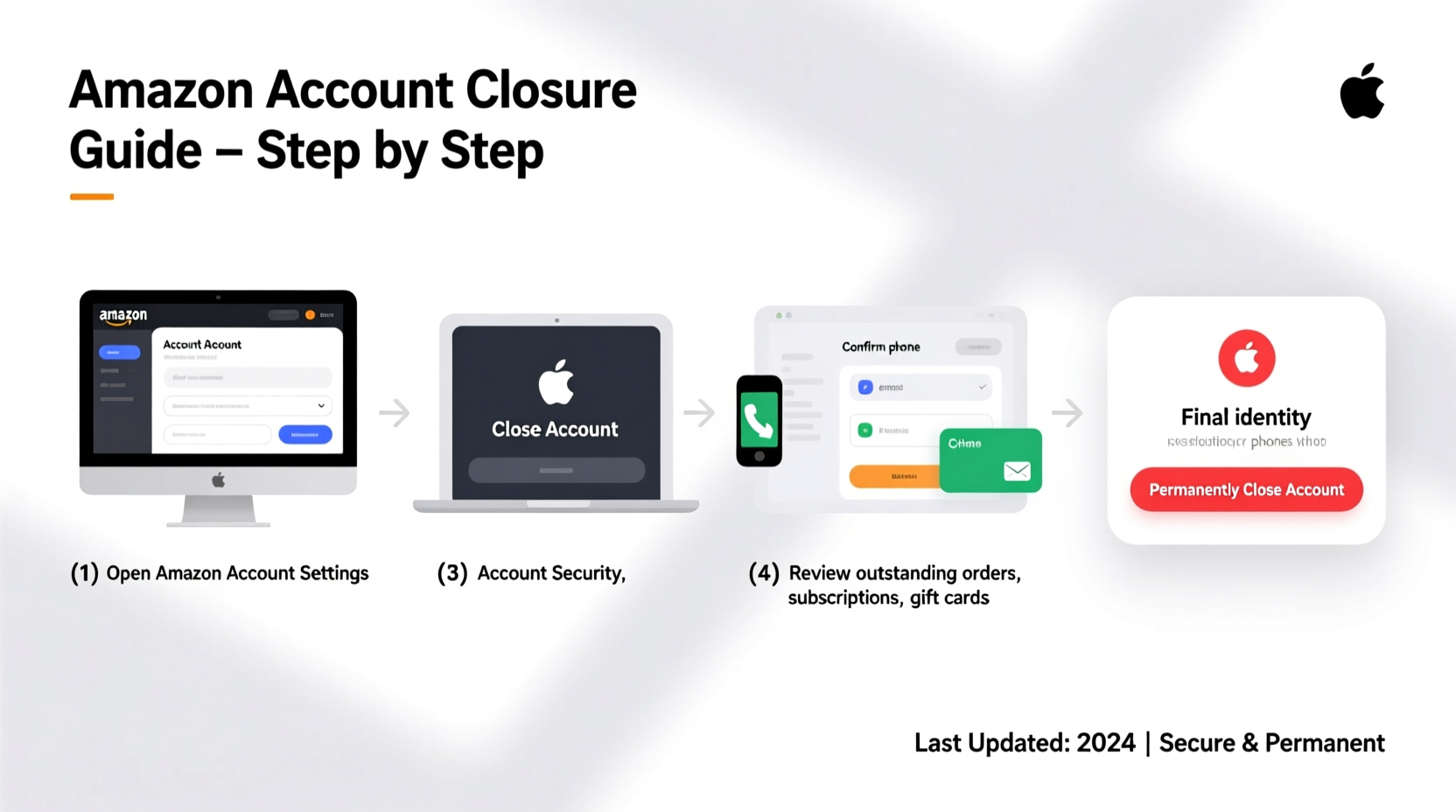Closing your Amazon account may seem like a straightforward decision, but doing it incorrectly can lead to lingering charges, lost order history, or unintended exposure of personal information. Whether you're concerned about privacy, reducing digital clutter, or simply no longer using the service, it's essential to follow a secure and thorough process. This guide walks you through every critical step to ensure your Amazon account is closed permanently, with no loose ends.
Why Closing Your Amazon Account Requires Care

Amazon isn’t just an online store—it’s a digital ecosystem tied to subscriptions (like Prime), payment methods, Kindle libraries, Alexa devices, third-party seller accounts, and cloud storage via Amazon Drive. Simply stopping use doesn’t remove your data or prevent automatic renewals. A full closure requires proactive steps to protect your identity, cancel recurring services, and preserve records you may need later.
Unlike deactivating or pausing, permanent closure means all shopping history, saved addresses, and wish lists will be erased. Once completed, you cannot recover this data. That’s why preparation is key.
Step 1: Back Up Important Account Data
Before initiating closure, archive essential information. Amazon does not provide a complete export tool for all user data, so manual backups are necessary.
- Order History: Go to “Your Orders” and filter by year. Save PDFs or screenshots of each page, especially for warranties, returns, or tax-deductible purchases.
- Digital Content: If you own Kindle books, Audible audiobooks, or Amazon Music purchases, download them to a local device or note titles for future reference.
- Subscriptions & Memberships: Record active subscriptions (e.g., Kindle Unlimited, Amazon Prime) and their renewal dates.
- Payment Methods: Note down all linked credit cards, bank accounts, or gift card balances—especially those with remaining value.
Step 2: Cancel All Subscriptions and Recurring Payments
Even after account closure, some subscriptions may continue billing if not canceled manually. This includes both Amazon-hosted and third-party services billed through Amazon Pay.
- Navigate to Account & Settings > Prime Membership & Subscriptions.
- Review active memberships: Amazon Prime, Audible, Kindle Unlimited, etc.
- Select each and choose “End Subscription.” Confirm cancellation.
- Check “Payment Options” for any merchant using Amazon Pay for recurring charges (e.g., streaming services).
- Remove Amazon as a payment method from external platforms before closure.
“Many users don’t realize that Amazon Pay subscriptions operate independently—canceling your account won’t stop ongoing charges.” — Sarah Lin, Consumer Privacy Advocate
Step 3: Settle Outstanding Balances and Redeem Credits
You cannot close an account with unpaid invoices, pending refunds, or unredeemed gift cards. Amazon requires all financial obligations to be resolved first.
| Item | Action Required | Where to Find It |
|---|---|---|
| Outstanding Charges | Pay any pending balance | Orders with “Pending” or “Charged” status |
| Gift Card Balance | Use or transfer remaining funds | Reload & Gift Cards section |
| Refunds in Process | Wait until completed or contact support | Order details under “Returns” |
| Seller Account Payouts | Withdraw final balance if applicable | Seller Central > Reports > Payments |
If you’re a third-party seller, ensure all customer inquiries are resolved and your final disbursement has been processed before proceeding.
Step 4: Remove Devices and Log Out of Connected Apps
Your Amazon account may be linked to smart home devices, tablets, TVs, and mobile apps. Failing to disconnect these can leave security gaps or disrupt functionality for other household members.
- Go to Devices in your account settings.
- De-register all Kindles, Fire tablets, Echo devices, and streaming sticks.
- For shared households, inform others that their access will end.
- Manually log out of Amazon apps on smartphones, smart TVs, and gaming consoles.
Step 5: Submit Account Closure Request
Amazon does not offer a direct “Close Account” button on its main dashboard. The process must be initiated through customer service.
- Visit Amazon Contact Us.
- Select “Your Account” > “Close Your Account.”
- Choose your reason for leaving (optional but recommended for feedback).
- Type a clear message: “I request the permanent closure of my Amazon account associated with [your email]. I confirm all subscriptions are canceled and balances settled.”
- Submit and wait for confirmation email within 24–48 hours.
Note: You may be asked to verify your identity via phone or email. Keep responses prompt to avoid delays.
What Happens After You Close Your Account?
Once confirmed, Amazon begins a deletion process that typically takes up to 90 days. During this time:
- Your profile becomes inaccessible.
- Past orders are retained internally for legal and tax compliance but are not visible to you.
- Reviews you posted may remain public unless manually deleted beforehand.
- All personal data is purged from active systems, though anonymized records may persist in backups per Amazon’s data retention policy.
After closure, attempting to log in will result in an error. Reactivation is not possible—creating a new account with the same email requires waiting at least 30 days, and historical data will not transfer.
Mini Case Study: Recovering from a Rushed Closure
Linda, a longtime Prime member, decided to delete her Amazon account after concerns about targeted ads. Without backing up her order history, she submitted the closure request. Weeks later, she needed proof of purchase for a warranty claim on a blender bought two years prior. Since Amazon does not restore data post-closure, she had to rely on her bank statement—a weaker form of verification. The manufacturer denied coverage initially, requiring a lengthy appeal.
Her experience underscores the importance of archiving transaction records before closure—even for items you don’t think matter now.
Do’s and Don’ts Before Closing Your Amazon Account
| Do’s | Don’ts |
|---|---|
| Back up order history and digital content | Assume automatic subscription cancellations |
| Cancel Prime and all recurring payments | Close the account with a negative balance |
| Remove all connected devices | Expect immediate data erasure |
| Contact support directly for closure | Reuse the same email immediately for a new account |
Frequently Asked Questions
Can I reopen my Amazon account after closing it?
No. Once closed, the account is permanently deactivated. You can create a new account with the same email address after a cooling-off period (usually 30 days), but none of your previous data, purchase history, or preferences will be restored.
Will my Amazon reviews be deleted?
Not automatically. Product reviews and ratings remain visible even after account closure. If you want them removed, delete them manually before submitting your closure request.
How long does Amazon keep my data after closure?
According to Amazon’s Privacy Notice, personal data is deleted from active systems within 90 days. However, residual information may remain in backup archives for up to one year due to legal and operational requirements, though it is no longer accessible or used.
Final Checklist Before Closure
- ✅ Downloaded past order history
- ✅ Canceled Amazon Prime and all subscriptions
- ✅ Removed linked payment methods
- ✅ De-registered all devices (Kindle, Echo, Fire TV)
- ✅ Used or transferred gift card balances
- ✅ Submitted closure request via Amazon Contact Us
- ✅ Received confirmation email from Amazon
Take Control of Your Digital Footprint
Closing your Amazon account isn’t just about stopping purchases—it’s a deliberate step toward managing your online presence and protecting your personal information. By following this structured approach, you ensure no financial surprises, maintain access to critical records, and minimize digital residue. In an era where data is currency, taking ownership of your digital exit strategy is as important as any entry point. If you’ve been considering this move, now is the time to act—thoughtfully, thoroughly, and securely.









 浙公网安备
33010002000092号
浙公网安备
33010002000092号 浙B2-20120091-4
浙B2-20120091-4
Comments
No comments yet. Why don't you start the discussion?